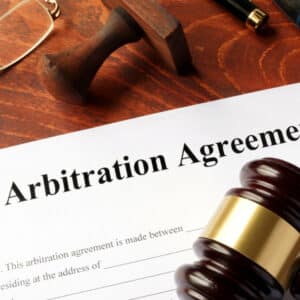When a couple decides to divorce, there are a variety of options open to them. While some may choose to seek a trial, others may choose to avoid the courts and instead consider arbitration or mediation. But what are these processes and how does arbitration compare to mediation in a divorce?
What is Arbitration?
Arbitration is one of several processes which may be used to resolve an impasse in a divorce. When a couple reaches a stalemate with regards to a part of their divorce settlement negotiations, they may seek arbitration to avoid going to court. But that’s not to say that arbitration and court are dissimilar.
Arbitration is in some ways like a trial, as it involves the arguing of cases before a “judge”. In this instance, however, the judge is an arbiter, and the setting isn’t a public court of law, but instead in private. Both parties – meaning each spouse and their respective attorneys – present their arguments concerning the specific issue which is holding up a divorce settlement. After hearing both cases, the arbiter will retire to consider both points of view and render their decision. As an arbiter is appointed with the consent of both parties, their choices, also known as an award, are usually not subject to appeal.
Arbitration has several distinct benefits, including:
- Ability to choose the arbiter
- Ability to select the issues the arbiter will consider
- Choice of the time, place and setting
- Privacy
What is Mediation?
Mediation, unlike arbitration, does not involve the judgment of a presiding arbiter. In many states, a family court judge may require a mediation session for those couples divorcing. During these sessions, both parties work together to reach an agreement with the help of a licensed mediator.
Mediation often occurs without the presence of both spouses’ lawyers. That’s not to say that these lawyers don’t play a part. Usually, both parties will meet with their legal teams before mediation sessions to get an understanding of the legal issues they need to consider and to understand their positions better.
During mediation, both partners work with the mediator to reach an agreement that is satisfactory to both parties. The mediator will likely meet with both partners separately first to gauge both their wants and needs, as well as their willingness to compromise.
While mediation isn’t for every divorce, it is not practical in divorces where there are bitter divisions, or where domestic violence is a concern. For those seeking a peaceful separation, it may be a good option.
Hire a Brooklyn Divorce Mediation Attorney Today
Filing for divorce can be a difficult decision. Finding the right attorney doesn’t have to be. Brian D. Perskin & Associates P.C. is one of the most trusted names in New York for divorce. Brian and his experienced team work diligently for their clients always ensure their best interests are maintained. So, if you’re looking for a divorce attorney willing to fight for you, call Brian D. Perskin & Associates P.C. today at 212-355-0887 for your free consultation.
